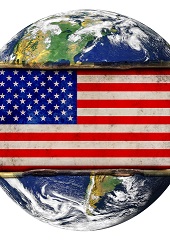The Nagging Realities of the U.S. Foreign Policy Debate
U.S. foreign policy needs a complete rethink to move past the post-9/11 model.
May 22, 2014

The world’s a mess and Republicans in the United States know exactly whom to blame for it. It’s all Barack Obama’s fault, of course. According to the GOP, President Obama is hapless, feckless and downright incompetent. He’s botched every foreign policy crisis he’s had to face and he’s tarnished America’s reputation abroad, they say. He’s forfeited American leadership, they assert.
Not only are these partisan attacks off-base, but they also distort history and obscure the reality of modern geopolitics. Given the central role the United States continues to play in world affairs, they have serious implications for America’s friends and allies everywhere.
America’s reputation has indeed been tarnished, but the degradation of the American brand derived from three major events that pre-date the Obama Presidency.
First, the Bush Administration’s embrace of rendition, torture and unlawful imprisonment sacrificed any moral authority America may have held at the outset of the 21st century.
Second, the invasion of Iraq undermined confidence in American competence in making sound foreign policy choices.
Third, the American-led collapse of the world financial system left America’s economic leadership in tatters.
These three events shook global confidence in America, especially among allies in Europe and the Middle East, to such an extent that the incoming Obama Administration faced an uphill battle in trying to restore American prestige.
Where Obama failed
But to be sure, President Obama did little to improve the situation. The failure to close Gitmo, the many partisan fiscal battles with Congress that have stalled the United States and global recoveries, the continuation and expansion of the NSA spying program and the uncontrolled use of drones have placed the American brand in further jeopardy, rather than improved it.
In President Obama’s defense, his failures on Gitmo, fiscal management, NSA spying and the use of drones are not solely his responsibility. After all, the Republican right staunchly supported each of these questionable initiatives.
As a result of the right’s finger pointing — and the left’s counter-posturing — on these and related issues, discussion of the decline in America’s global leadership may simply enter a partisan morass of claim and counterclaim. Key realities of the geopolitical environment are being overlooked.
The rise of new money
And there are indeed some signal realities of twenty-first century geopolitics that the United States must confront, starting with the emergence of both China and the European Union as global economic powers.
Although neither China nor the EU have yet challenged American power directly, they compromise American authority by sheer dint of their purchasing power.
Since the outset of the 21st century, China has been a black hole into which the world has dumped natural resources. This has not only sustained economic growth in China. It has also been pivotal to growth in the world’s major resource economies, including Brazil and Russia.
Chinese foreign policy
So far, China has facilitated a virtuous economic circle by selling finished goods to the United States in exchange for dollars and then buying raw materials from resource economies with those same dollars. In effect, China is empowered on global markets by the dollars it acquires through trade with the United States.
But even though China’s geopolitical clout is largely derived from its economic relationship with the United States, China uses that clout in a way that is wholly at odds with the geopolitical objectives of its host economy.
Accordingly, to fully understand the impact of China’s purchasing power, it must be taken within the context of the central theme of Chinese foreign policy, which states quite simply that China won’t tell anyone what to do inside its own borders.
Under this principle, a tin pot dictator with some raw materials to sell is able to sell them to Chinese buyers no strings attached. Were the tin pot dictator to sell them directly to a United States customer, Uncle Sam would be right there jawboning about human rights and other nagging liberal realities.
The end of iron curtains
Although the European Union takes a far more aggressive stance with respect to social issues, the EU has nonetheless emerged as a big customer on the world market. In spite of the fact that United States and European goals are often aligned, the EU’s purchasing power undermines American economic hegemony by diminishing the centrality of the United States in the world economy.
The parallel emergence of China and the EU as economic superpowers is a challenge that the United States has not had to face since the end of World War II.
U.S. politicians nonetheless try to impose onto this significantly more complex geopolitical state solutions meant for the relatively simple bi-polar world of the Cold War, which established two distinct spheres of influence and gave the United States a clearly identified enemy.
Having an enemy such as the Soviet Union empowered the United States to use foreign policy expedients, including the installation of dictators and puppets, which would be anathema in the current post-Cold War environment.
The internet wars
As America’s economic hegemony is undermined, so too does technology undermine stability in many jurisdictions. At the conclusion of the Second World War, the voices of ethnic and sectarian strife were muffled through the imposition of authoritarian regimes aligned with either the United States or the Soviet Union.
Today, it is no longer possible to impose dictatorship, especially since the developed world has championed the concept of liberal democracy since before the fall of the Soviet Union.
Liberal democracy is a fragile concept at its very best, but when it is infused with the instantaneous communications facilitated by technology, it can be downright incendiary. The world today is riven by civil strife on a scale not seen since the days leading up to the Second World War.
Rethinking the foreign policy debate
For Republicans to suggest for an instant that the United States can take sides in ethnic and sectarian conflicts that date back centuries seems at best naive — at worst foolhardy. This is especially true when American expertise on such issues as the Sunni/Shi’a divide is either limited or riven by the same “expert” opinions that underlie the conflicts in the first place.
American foreign policy in the 21st century needs a complete rethink. Partisan bickering only serves to take us further away from the formulation of sound policies that are in tune with the times and, more important, are in the best interests of global stability.
Takeaways
US foreign policy in the 21st century needs a complete rethink.
US politicians try to impose Cold War solutions onto a significantly more complex world.
The US must confront the emergence of both China and the European Union as global economic powers.
US foreign policy started struggling well before Obama, but the new president has done little to restore it.
The Iraq war, the use of torture and the financial collapse led to the lion's share of decline in American power.
A complex world calls for complex discussions. The US cannot let partisan bickering dictate foreign policy.
Read previous

The New Vietnam War
May 22, 2014

